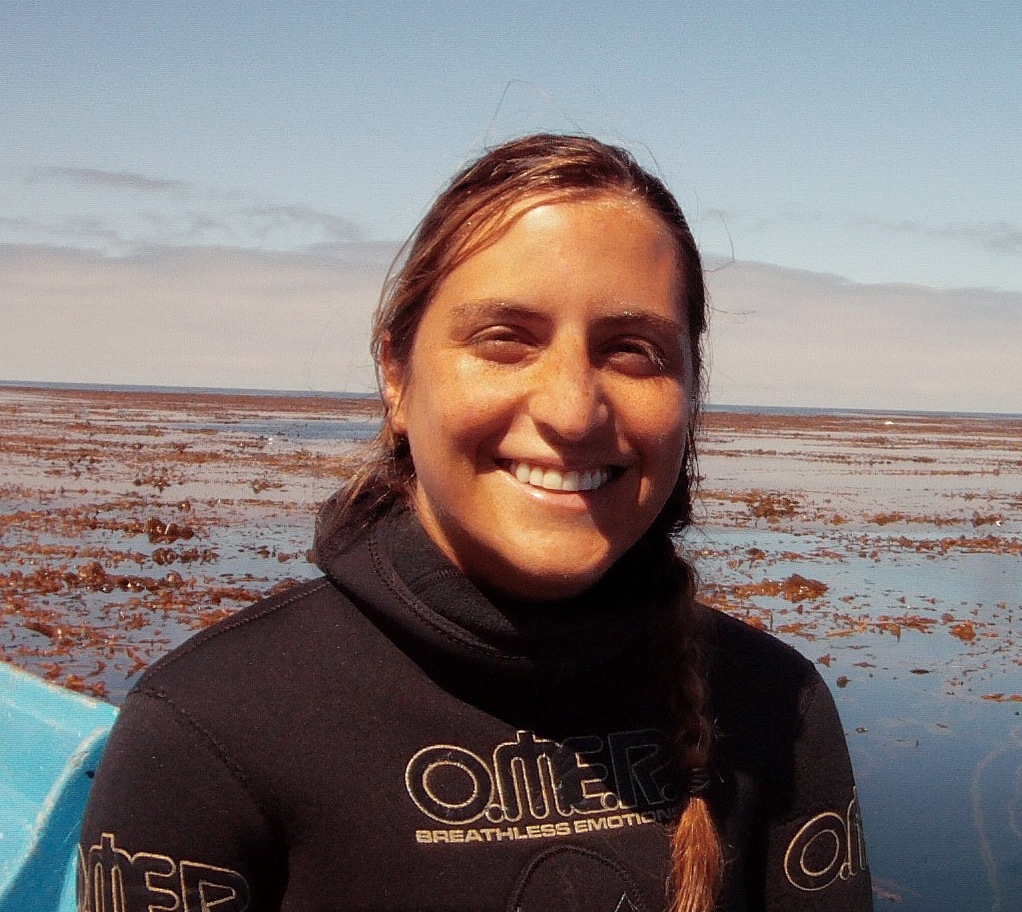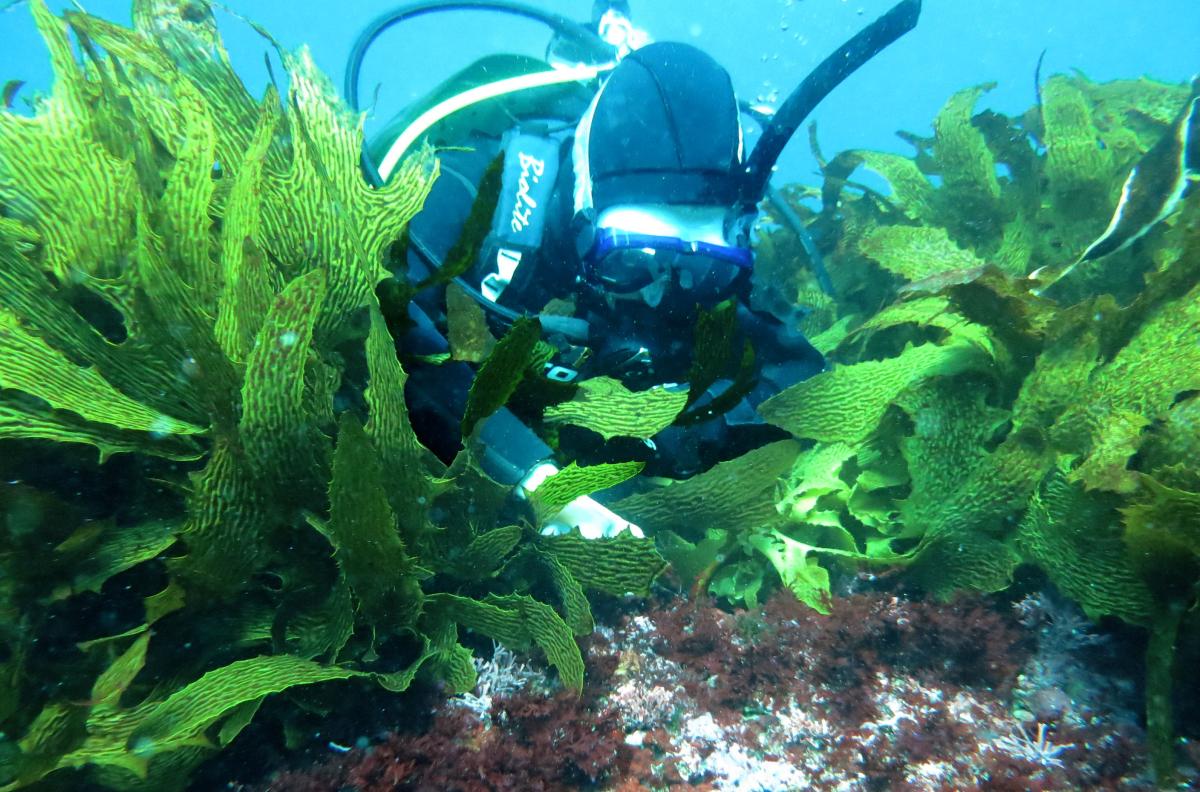
As a child, Dr. Anita Giraldo-Ospina knew she was destined for a career in marine biology, and her atypical path to becoming a researcher at MSI is a story of globe-trotting, remarkable work ethic, mature self-reflection, and deep scientific talent. Growing up in Colombia, Dr. Giraldo-Ospina was determined to find the skills and educational path that would make her a global and effective marine biologist. With encouraging parents, she trained as a diver at the earliest possible age — 12 years old. Then, at only 18, she enrolled in an English immersion program on the other side of the world: James Cook University in Townsville, Australia, a place renowned for tropical marine biology. This is where, during these pivotal years, she got fieldwork experience and learned how science was conducted.
These first hands-on research opportunities were formative and gave her the confidence to go farther. Soon she landed her first job as a research assistant on tropical seagrass, where she learned varied and critical oceanographic skills.
Fast forward many degrees and trips across international datelines (a master’s in Baja Mexico and a PhD in Southwestern Australia), Dr. Giraldo-Ospina found herself with a choice to make: take a highly sought-after faculty position or continue to do fundamental and solutions-based research here at the Marine Science Institute. Lucky for us, she chose MSI and has now worked with her mentor, Dr. Jenn Caselle, for many years.
Dr. Giraldo-Ospina’s work focuses on the use of time series data to track changes in kelp forests across the U.S. West Coast. This work is essential for understanding how things like heat stress from climate change or sea urchin plagues are causing major changes in kelp abundance in different regions. Using sophisticated models, Anita’s work can also explain why some kelp forest locations across California have fared better than others. These models provide key insights into how coastal restoration programs, federal programs and management, local communities, and nonprofits can assist in kelp recovery. In our discussions, Dr. Giraldo-Ospina mentioned that this work highlights how “long-term record keeping and programs like PISCO and the Santa Barbara LTER (both MSI-hosted programs) provide huge scientific opportunities that, when mixed with good models and teamwork, produce outputs useful for effective conservation, management decisions, and policymaking.”
Science Career Takeaways: Funding, Personal Reflection, and Connecting with Local Knowledge
Dr. Giraldo-Ospina surprised me with her maturity, depth of experience, and insightfulness about how science careers are made, changed, and challenged. Like many burgeoning scientists, Dr. Giraldo-Ospina had to continuously work in college to support herself, and to further her education she needed financial support — something becoming rarer these days. She found a fellowship in Mexico for her master’s program in Marine Ecology and has since been funded by labs receiving critical grants and contracts.
I knew that I didn’t want a PhD for a career move but for skill set expansion, and so I could be in charge of the science I proposed at a deeper level.
While working in Mexico, Dr. Giraldo-Ospina thought deeply about her career future and fretted over a question many young scientists face: Should I get a PhD? “I wanted to understand the trade-offs and what the benefits to me and my career were going to be. It took me a long time to decide, but ultimately, I knew that I didn’t want a PhD for a career move but for skill set expansion, and so I could be in charge of the science I proposed at a deeper level.” This is what I hope every marine science trainee thinks about when transitioning into an independent PI.

Future of Dr. Giraldo Ospina’s Work to Study and Protect Kelp Forests Around the Globe
Anita and I also talked about her next steps. Her work directly feeds into the California Kelp Restoration and Management Plan currently being developed by the California Department of Fish and Wildlife and the California Ocean Protection Council a group for which she is on the scientific advisory committee. Excitingly, her work is also influencing kelp restoration decision-making globally. Last year, The Kelp Forest Alliance launched the Kelp Forest Challenge to protect and restore 4 million hectares of kelp forests globally by 2040. Anita was part of the global group of people that helped develop this target. Excitingly, any group can contribute to the challenge with added stewardship, science, and funding.
As you can see Dr. Anita Giraldo-Ospina’s work is already having a positive impact our local oceans and is of the utmost importance as kelp forests here in California continue to suffer from disturbances. I look forward to seeing where her work will take her in the future, and I can only imagine the continued positive impact it will have on our own American coasts and internationally.

If you are interested in helping fund the work of MSI researchers like Dr. Giraldo-Ospina, please click on the Give button, or use the QR code on the left.